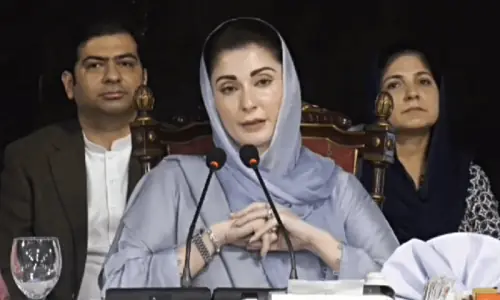Iqbal Qaiser is someone who would never be reluctant to extend his helping hand whenever you need it in the execution of any meaningful literary and cultural project. He is a tough guy who can travel hundreds of miles in challenging conditions to meet a little known raconteur to dig out an obscure story. He has endurance to brave the harshest weather to have a look at a ruined site or dilapidated monument in a far-flung area if it’s reputed to have some tale to tell. Iqbal Qaiser is a writer, poet, researcher, folklorist and above all oral historian with insatiable passion for rediscovering our past lost to us due to our lack of historical consciousness or flawed collective memory.
His latest book is Ujray Daraan De Darshan (Visiting the Gateways to Desolation) published by the Pakistan Punjabi Adbi Board, Lahore. Its sub-title describes it as ‘Historical Fiction on the Jain Temples in Pakistan’. Sounds unusual? But the fact is that once upon a time what now constitutes Pakistan had a sizable Jain community, vestiges of which are still discernable. Remember, for example Rawalpindi’s Bhabra Bazaar and Ferozepur Road’s Bhabra Stop in Lahore? Bhabras, an ancient merchant community in Punjab, had predominantly been followers of Jain faith and thus vegetarians.
“Kaytarhian hee banneeaykitarhay Bhabharian sunniaray (so many are traders and many more Bhabra goldsmiths),” says Bhai Gurdas (1550-1620) in his Var. With the passage of time, due to multiple reasons the number of Jains dwindled. The community that could hardly survive the ravages of time was decimated by the bloody whirlwind that accompanied the Partition. The vanishing Jains were blown across the border in 1947 to India like most of the Hindus and Sikhs. Their social presence here was so negligible in the nineteenth century that it has almost ceased to be part of our sanitised collective memory.
But the situation was pretty different during the medieval period of our history, quietly asserts Iqbal Qaiser by embarking on a journey to sacred Jain temples that lie in utter ruins across the fast swathes of Punjab and Sindh in Pakistan. He has visited Jain holy places in Nagarparkar, Amarkot, Haala, Hyderabad and Karachi in Sindh, and Rawalpindi, Jhelum, Kalabagh, Pind Dadan Khan, Bhera, Sialkot, Narowal, Gujranwala, Khanqah Dogran, Lahore, Kasur, Multan, DG khan, Bahawalnagar and Bahawalpur. One can go on and on with the list. This has been mentioned with a specific view to give our readers some measure of how extensive though scattered the Jain settlements had been in Punjab and Sindh.
The Jains had been socially quite active and politically visible during the reign of Emperor Akbar in the sixteenth century. They took part in the interfaith dialogue that underpinned Akbar’s secular and tolerant policy in a stunningly diverse India. Iqbal Qaisar uses a composite format in his book which means he has something for everyone. Going through the book one is delighted at small wonders it offers in the garb of cultural insights. It’s a sort of potpourri. At one moment it reads like a travelogue and at another like imaginative prose and at yet another moment a chronicle of the death of the sacred not foretold.
The book is both exhilarating as well as disconcerting. The way Iqbal Qaisar describes and narrates lifts you but what he describes and narrates shatters you. The sacred places which were once experienced by the people as graced by the divine presence have either been converted into shoddy residence quarters or offer shelter to wasps, scorpions and snakes. They are little more than an overpowering stench of indifferent times we live in. The book is a must read for those who are interested to know how the destruction of our past has distorted our present.
Najm Hosain Syed is a towering figure of our times that has immensely enriched our language and literature. He has a deeply analytical mind and fecund imagination. He is prolific while being profound and versatile while being rooted in the tradition. Syed is a poet, playwright, literary critic and a teacher. In his literary carrier spanning more than five decades, his creative output has already earned him an enviable place at the high table of Punjabi literature. He is one of the pioneers of modern poetry on this side of the border. He has brought out scores of collections of poetry, written a number of plays and penned innumerable articles and books that interpret classical poetry. His oeuvre is huge that needs to be critically appraised. But in a society where poetry whether inspired by intuition or driven by tradition is held to be an epitome of creativity, cerebral activity such as criticism is thought to be merely a part of marginalia. So no systematic effort has been afoot to critique his work.
Asma Qadri, a well-known scholar and associate professor at the Punjabi Department at the Oriental College, with a number of publications to her credit, has made a welcome beginning with her two books ‘Jor De Bhet’ and ‘Rung Suttar’ published by Faculty of Oriental Learning, the Punjab University, Lahore. The former analyses some of the Syed’s poems and the latter focuses on his short plays. In both the books, it seems, the effort is to explain the poems and plays in question, not to critique them. The task of explaining and elucidating is seemingly inspired by a desire to communicate Syed’s view of sociocultural embeddedness of the texts to the readers rather than appraising them independent of the author’s apparent intent. Since Najm Hosain Syed is not an easily accessible writer to easygoing readers, Asma’s books are quite relevant and can serve as a bridge that brings readers close to savoring the provocative delights, manifest and hidden, that Syed’s writings offer. But the stuff is not meant for those who are in the habit of expecting saccharine songs from poets. — soofi01@hotmail.com
Published in Dawn, March 2nd, 2018





























